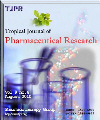
|
Tropical Journal of Pharmaceutical Research
Pharmacotherapy Group, Faculty of Pharmacy, University of Benin, Benin City, Nigeria
ISSN: 1596-5996
EISSN: 1596-5996
Vol. 14, No. 8, 2015, pp. 1399-1404
|
 Bioline Code: pr15183
Bioline Code: pr15183
Full paper language: English
Document type: Research Article
Document available free of charge
|
|
|
Tropical Journal of Pharmaceutical Research, Vol. 14, No. 8, 2015, pp. 1399-1404
| en |
Salvianolic Acid-A Induces Apoptosis, Mitochondrial Membrane Potential Loss and DNA Damage in Small Cell Lung Cancer Cell Lines
Wang, Le-Qiang; Hua, De-Feng; Li, Xiao-Meng; Li, Juan & Guan, Yun
Abstract
Purpose:
To examine the anticancer effect of salvianolic acid-A against human small cell lung cancer
(SCLC) cells (H-69).
Methods:
In vitro antiproliferative effect of salvianolic acid against SCLC cell lines was evaluated by 3-
(4,5-dimethylthiazol-2-yl)-2,5-diphenyltetrazolium bromide (MTT) assay. Apoptosis induction by
salvianolic acid-A in these cells was measured by videomicroscopy along with fluorescence microscopy
using Hoechst 33258 staining. The effect of the compound on mitochondrial membrane potential loss
was detected by flow cytometry using rhodamine-123 as fluorescent probe. Gel electrophoresis was
used to analyze DNA fragmentation after salvianolic acid treatment.
Results:
The results revealed that salvianolic acid-A induces dose-dependent as well as timedependent
growth inhibitory effects against SCLC cancer cells. Videomicroscopy analysis revealed that
SCLC cells became rounded (dead) and refringent after drug treatment which increased with increase in
salvianolic acid-A dose. Fluorescence microscopy demonstrated that salvianolic acid-A induced dosedependent
chromatin condensation in SCLC cells which is characteristic of apoptosis. DNA
fragmentation was induced by various doses of the compound again hinting at apoptosis. Flow
cytometry analysis using rhodamine-123 showed that salvianolic acid-A also caused substantial loss of
mitochondrial membrane potential.
Conclusion:
The results suggest that salvianolic acid-A is a potential anticancer and apoptotic agent
against drug-resistant small cell lung cancer.
Keywords
Lung cancer; Apoptosis; Salvianolic acid-A; Flow cytometry; Anticancer activity; Videomicroscopy; Fluorescence microscopy; Mitochondrial membrane potential; Rhodamine-123
|
| |
© Copyright 2015 - Tropical Journal of Pharmaceutical Research
Alternative site location: http://www.tjpr.org
|
|
